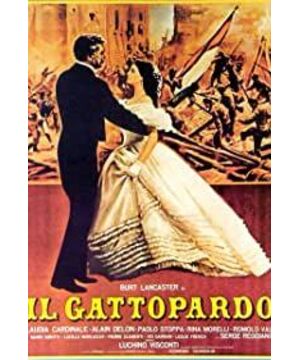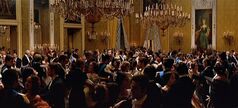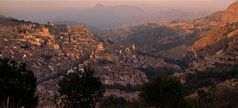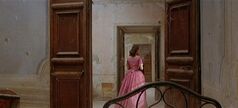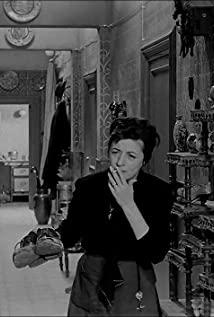Giuseppe Tomasi di Lampedusa "Leopard"
Giuseppe Tomasi di Lampedusa, (1896-1957) Duke of Parma and 11th Prince of Lampedusa, Sicilian writer. Taciturn and lonely, spends most of his time reading and meditation, often calling himself "a child who loves loneliness." He is well-known for his only novel "Leopard", which tells the story of a noble family in Sicily during the Italian Revival Movement. The text is quaint and runs counter to the style of modern Italian literature. Served as an artillery officer during the First World War. Due to a mental breakdown, he was unable to engage in the diplomatic work he desired, so he stayed at home, admired literature and art, and wrote for self-entertainment. He began writing his famous historical novel "Leopard" (1958) in 1955, which was published after the author's death and was praised. It portrays the mental state of Don Fabrizio, Prince of Salina, who watched the Sicilian power shift from the hands of the ancient Bourbon aristocracy to the Kingdom of Italy and the greedy free bourgeoisie in the 1860s. , But his nephew did the opposite, not only speculating in the revolution, but also marrying the newly in power class. The work supports the conservative views of the old prince, is full of exciting dramatic plot, and the writing is rich and colorful, and is regarded as one of the masterpieces of contemporary Italian literature. ( Http://baike.baidu.com/view/2942256.htm )
Great-grandfather is an astronomer. Lampedusa is an only child, and his lonely childhood has developed an introvert and silent character. Reading is his hobby, which gives him a lot of fun.
Lampedusa began traveling to Paris with his parents before he was 10 years old. Later, he learned French and could read French books directly. He liked the cultural atmosphere of Paris and French literature, and appreciated Rousseau, Stendhal, Balzac, and General. Rust and other French writers.
In the 1914-1915 academic year, he studied at the Faculty of Law of the University of Genoa. At the outbreak of the First World War, he interrupted his studies, was called into the army, was wounded on the battlefield, was taken prisoner, and was locked up in the Szombathely prison camp in Hungary. Later, Lampedusa successfully escaped from prison, went through hardships, and returned to the motherland on foot.
Since 1925, he has traveled to London many times. This made him become attached to English literature. Classical writers such as Shakespeare, Dickens, and Thackeray impressed him. He met his future life partner-Alexandra Wolfe Stomelsey in London. Alexandra is Latvian and his mother is Italian. On August 24, 1932, a couple held their wedding in a church in Riga, Latvia. After marriage, while staying in Riga, Lampedusa studied Russian and read Russian literature. Poets and writers such as Pushkin and Tolstoy brought him into a new cultural world.
After marriage, he and his wife returned to Palermo's ancestral house, but his mother-in-law and daughter-in-law had a disagreement, and finally Alexandra decided to return to Latvia. In 1934, Lampedusa's father died, and Giuseppe became the eleventh Prince of Lampedusa. During World War II in 1940, Lampedusa was enlisted again, but was finally able to return home because he had to manage the family farm. Around this time, Lampedusa reunited with his wife while taking refuge in northern Sicily. The family was reunited, but the family’s ancestral house was eventually blown up, and Lampedusa’s mother passed away in 1946.
From 1953 to 1955, he gathered some talented young people in private lectures in his hometown to discuss literature with them. Some of this group of people will become famous scholars in the future. For example: Gioacchino Lanza di Mazzarino (the son of Lampedusa) became a scholar of music; Francesco Orlando became an expert in French literature. "Reminiscences of Lampedusa" written by Orlando provides a lot of valuable information about teachers at this stage. The period from 1955 to 1957 was the period when Lampedusa devoted himself to literary creation. The death of his parents, the sale of his grandfather’s house, and the destruction of his house by a plane during World War II dealt a great blow to Lampedusa, and made him feel more lonely and lost. In the summer of 1954, he accompanied his cousin, the poet Piccolo, to a literary conference in San Pereclino, Lombardy. The creative consciousness that sprouted in his early years has matured day by day, and since then, he has been engrossed in the creation of the novel "Leopard". Based on the life of the author's grandfather, the novel tells the story of an aristocratic family in Sicily during the Italian Revival.
About the Author
Giuseppe Tomasi di Lampedusa, a modern Italian writer, was born on December 23, 1896 in a family of a declining nobleman in Palermo, Sicily. He himself is the hereditary Prince of Lampesa. From an early age, Lampedusa has shown clever talent, hardworking and studious spirit, and a wide range of interests. Bo Er, his boyhood was not happy. Due to constant changes in the family, his life was full of loneliness and turmoil. After the outbreak of the First World War, he resolutely enlisted in the army, rushed to the front, and was captured in a battle. Later, he escaped from the prisoner-of-war camp, went through hardships, and returned to his motherland. In 1925, he retired from the army. At that time, it was the time when Mussolini was in power. He stayed in Britain and France for a long time because he was unwilling to serve such a government. It was not until the early 1940s that he returned to Sicily and stayed at home. The decline and fall of the aristocratic class made him melancholy, and the failures of social changes made him disappointed. Therefore, in the extreme depression and loneliness, he began to use literature to express his emotions and vent his depression. The creative ideas that sprouted in the early years have matured day by day. "Leopard" was written in a not too long time. This is his only novel. This work was published in Milan in November 1958, and immediately shook the Italian literary scene with its unique artistic power. Critics call it "a epoch-making masterpiece" and "one of the best novels of the 20th century." However, Lampedusa did not enjoy the joy of success. Just one year before the publication of "Leopard"-in 1957, when he had just copied the manuscript of this work, the disease took his life.
abstract
The time of the story is May 1860. On the outskirts of Palermo in Sicily, in the residence of Prince Fabrizio of Salina, the family of Prince Salina was having dinner after reading the Rosary for the evening. On the wall of the hall, the coat of arms of the King of the Salina family hung, on which was painted a leopard with teeth and claws standing on its hind legs. Nearly 50 years old, Fabrizio is tall and strong, just like this leopard ruling the Salina family majesticly. However, at this time, the family has shown signs of defeat everywhere. Fabrizio's eldest son, Francesco, was lazy and inactive. His favorite second son, Giovanni, suddenly ran away from home, preferring to be a small clerk and live independently, rather than to spend his life in the comfort zone. Only three daughters can accompany him at home: Carolina, Goncheda and Catrina, and his youngest son Paul, who is only 16 years old. Seeing the daily decline of the noble class and the daily destruction of his family property, he is not only powerless, but even has no desire to remedy it. At this time, the situation in Sicily was very tense. Garibaldi is leading the Piedmontese army and is preparing to make a major landing attack. But Fabrizio still took the risk, Starry Night went into the city to sympathize with people for a tryst. Early the next morning, his nephew, Tancredi, rushed to say goodbye to him, who was the son of sister Fabrizio. His brother-in-law was squandered and died after exhausting all his possessions. Don Credi lost his mother again when he was fourteen. The king put him in the custody of Fabrizio. Don Creddy is a passionate, energetic, and handsome young man. Fabrizio likes him even better than his son. At this moment, he was preparing to join Garibaldi's army and declare war on the Bourbon dynasty. Soon, in order to avoid the turmoil of the war, the Salina family went to their territory in Donafugata to spend the summer. At this time, Garibaldi's army had occupied Sicily, and the Bourbon dynasty had completely collapsed. Don Credi is already a lieutenant in Garibaldi's army. It is precisely because of his relationship that the Salina family's summer trip was successfully passed through the various levels. At the dinner welcoming the family of Prince Riccio of France to Donafugata, all the leading figures of the local upper class were present. Among them are the city's rapidly rising nouveau riche, the new mayor Don Carlogello and his daughter Angelica. When Garibaldi’s army landed, Don Carlogello not only actively and frequently, but also used the crisis of war to sell a large amount of food at high prices, made a lot of money, and bought a lot of real estate. He became the mayor, and his fortune was already able to compete with the Salina family. In addition, Don Carlogello is the leader of the local liberals and enjoys high prestige among the voters, but Yes, because he started from a low-born nouveau riche, he dressed rustic and behaved vulgarly. There was no market in aristocratic society. His daughter Angelica, who has received a lot of education while studying in Florence, behaves like an aristocratic lady. Her tall, well-proportioned and elegant figure, milk-like white skin, thick curly hair, and dignified appearance surprised the guests present, and made Tang Creddy fall in love at first sight. He quickly left the Goncheda he was pursuing and fell in love with Angelica. Early one morning, Fabrizio received a letter from Don Credi. The letter expressed his fiery love for Angelica and asked Fabrizio to propose to Angelica on his behalf. Although Fabrizio, a love veteran, also coveted Angelica’s beauty, out of his niece’s love, he still proposed this marriage to Don Carlogello, and the beautiful Angelica promised one day. . Don Carlogello did not consider that Don Creddy was already a bankrupt noble child, and promised to give his daughter a generous dowry. So, on a rainy night, Tancredi, who was already a regular officer under the king of Sardinia, rushed back to Donafugata and got engaged to Angelica. Both families have benefited from this marriage. The dowry brought by Angelica saved the Fabrizio family's impending collapse. The association with Prince Salina, a great nobleman, also enabled Don Carlogello to learn the style and style of nobility and became a new nobleman. After the Kingdom of Sicily and the Kingdom of Sardinia were merged, the Turin government wanted to appoint several famous people in Sicily. Among these famous people, Fabrizio topped the list. But he politely declined, and recommended Don Carlogello to be a member of the staff. Because the new kingdom, the new government, and the new unity did not bring any new changes to Sicily. Palermo's upper class society has restored the order of life in the past. The whole day is a variety of communication, a refurbished banquet, and a colorful dance party. After Angelika married Tangcredi, under the guidance of Tangcredi, she mastered some of the etiquette and entertainment of the upper class. Therefore, when Tangcredi introduced her to Palermo's social world, Angelika appeared at the ball as a very qualified princess, and won the admiration of the aristocratic society. Burning, Fabrizio felt lonely in this lively and extraordinary feast and all-night dance party. He would rather walk home alone to admire the street scene in the morning. 26 years passed in a flash. Fabrizio felt the flow of life slowly leaving his body. This once was such a strong "leopard, after repeated bad physical conditions, he finally fell down in 1886 when he was 73 years old." Down. Over the next 21 years, the Salinas were scattered. By 1901, in the mansion on the outskirts of Palermo, there were only three old ladies who were nearly 70 years old: Long Lorina, Goncheda and Catrina. At this time, Tangcredi had been dead for three years. Angelika is also nearly 70 years old. The city of Palermo is preparing to celebrate the 50th anniversary of Garibaldi’s liberation of Sicily. She is a member of the preparatory committee.
Goncheda was very empty at home, especially when he saw the skin of Bendico, his father's favorite dog, colluded with her bitter memories. So, sent someone to throw it out.
Appreciation of works
This is a work with a strong family autobiography. It describes the history of an ancient aristocratic family in Sicily declining in the revolutionary storm of the bourgeoisie and being replaced by the emerging bourgeoisie. "It refers to the emblem of this family. It symbolizes the power and majesty of Prince Salina and the family. The novel is based on the loss of power and decline of the Prince of Salina and the Riccio family in the turmoil of the times and historical changes. The novel unfolds the intricate scenes of struggle, compromise, union, and change between the old and new classes. It portrays the complex inner world of the protagonist Riccio, the city of France, and the changing faces of the various characters around him in the cold world, reflecting an era in which the power of the Italian feudal class and the bourgeoisie alternated in the second half of the nineteenth century. For nearly 26 centuries from 735 BC to 1860 AD, Sicily has always been a colony dominated by foreigners. Invaders from Greece, Carthage, Eastern Gothic, Chen Zhantian, Saracens, Normandy, Spain and other aggressors gathered in succession. They wanted to impose their politics, economy and culture on the people of Sicily in order to assimilate the people of Sicily. As a result, this beautiful island has become a deformity under the dual squeeze of the roots of history and foreign aggression. In the mid-nineteenth century, under the influence of the surging bourgeois revolution on the European continent, Italy also experienced a vigorous national rejuvenation and unification movement. Although this revolution was defeated, this massive movement had a powerful impact on the feudal system and stripped off the power of foreign rulers, thus opening the way for the unification of Italy. In 1859, Italy and France were in the same position as Austria. For the victory in the war, this further promoted the revolutionary wave in northern and central Italy, and made northern and central Italy the first to achieve unity. Soon, the wave of revolution swept across all parts of the South. In April 1860, a peasant uprising broke out in Sicily, which was brutally suppressed by government forces. Garibaldi, a young Italian party member, heard the news and led his army to assist. He landed in Marsala, Sicily, and won the first battle, which greatly inspired the people of Sicily. Garibaldi advanced in victory, and soon defeated all of Sicily and destroyed the regime of the Bourbon dynasty. Lampedusa’s work is based on the turbulent period before and after Garibaldi’s landing, describing the various performances of Salina, an ancient and dying family in this period of historical change. As the prototype of Prince Salina is the author’s great-grandfathers Giulio and Tomasi, the author undoubtedly expressed his emotions in the description of the image of Prince Fabrizio of Salina. However, tears of sympathy did not obscure the writer's sharp gaze. Lampedusa The depiction of this image is basically calm and objective. As the most prominent nobleman in Sicilian society at the time, Fabrizio was unable to grasp his own destiny in the face of the tide of social change, and could only be like duckweed on the water, letting it drift with the trend. On the other hand, he was inextricably linked with the old dynasty, the old system, and everything. Therefore, when he had to follow the trend of history, he often expressed his nostalgia for the past and lamented the passing glory and wealth. I can't understand the new changes and have to adapt to it, and I have to abandon it when I miss the past.
View more about The Leopard reviews


